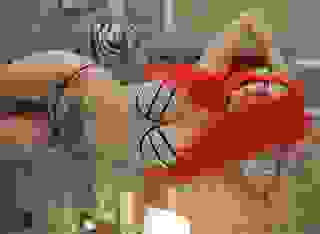- Novels and Novellas
- Hartstein Ch. 02
Note: You can change font size, font face, and turn on dark mode by clicking the "A" icon tab in the Story Info Box.
You can temporarily switch back to a Classic Literotica® experience during our ongoing public Beta testing. Please consider leaving feedback on issues you experience or suggest improvements.
Click hereIllustrated version of this chapter available on request
Paul was deep in thought as he reread the last two pages over again. It was ten after eleven on a Tuesday morning. He had been writing since six, and had two pages that were almost right to his way of thinking, when he heard the mailman approaching his front door, and then saw the letter drop from the mail slot onto the wooden floor.
A letter not a bill? I don't usually get letters ... and it's too thin to be another rejection slip. He put it out of his mind and finished reading his work for the fourth time, made two minor changes in the dialogue and prepared to resume typing, but couldn't concentrate as thoughts of the previous day with Celia and Jim kept coming back to him.
Did Jim suspect anything? The room had fairly reeked of sex. How many beers had he had? Had Celia given anything away after he'd left? Could he return to their place without a confrontation?
These and other questions pried at him, forcing him to get up from his PC and pick up the letter still lying on the floor by the front and only door to his tiny apartment. Cursing under his breath, Paul bent down and picked up the solitary piece of mail and glanced at the sender's name: Carol Cobillard, Regal Publishing, New York, NY.
He felt his knees go weak and he stumbled back to his chair and sat down hard. Good news ... this had to be good news, he told himself and carefully opened the letter.
Dear Mr. Hartstein:
Allow me to introduce myself. I am the Editing Agent for Regal Publishing. I have just reread your work--Woman on the 7:10 to Brewster and found it to be extremely interesting. I will be candid with you. It is not our policy to publish a first time author offering us a novella. The truth is they do not as a rule, sell well—period. However I am interested in reading any novel you may have, either finished or in progress, so long as there is a chapter or two completed.
As a show off good faith I have enclosed a check in the amount of a $500.00 retainer toward the future publication of Woman on the 7:10 to Brewster which should sell reasonably well after you have established a reputation through your subsequent work.
Toward that end, I would like to meet you for lunch on Tuesday, the 7th of February if that is acceptable to you. Please bring a sampling of your current work with you and I will read it during lunch. Call me on xxx-xxx-xxxx to confirm or set a different date.
Sincerely yours, Carol Cobillard
It would be difficult to describe the sudden rush of elation that ran through Paul on reading the letter. He wanted to call everyone he knew, but had no phone. He wanted to scream the news out the window but it was nailed shut. And so he did what he could do under the emotional stress he was under--he slowly sank down t the floor and began to cry.
He was happy, perhaps for the first time in quite a while. With each tear rolling down his cheeks he felt the pressure of possible failure as a writer falling away. He took a deep breath, stopped crying and wiped his eyes then got to his feet and returned to his PC and began working anew, this time with a more meaningful purpose, and before long had another thee pages--nearly perfect pages, and he finished another page before calling a halt and making himself something to eat.
He was famished and ate twice as much as normally would. He counted his money and found that aside from the next week's rent, he had ten dollars and thirty seven cents to his name.
Paul reread the letter, and sat back down at his PC and finished the chapter. All in all he'd knocked out sixteen pages before quitting for the day and going out to the local diner and having their blue-plate special—meatloaf, mashed potatoes and carrots for dinner.
________________________________________
The Gaby Brasserie Française proudly dominated the entrance of the Sofitel New York on 44 W. 45th St. (Fifth & Sixth Avenues to those unfamiliar with New York City.) Its façade gleamed in the dappled sunlight, emerging with gothic splendor from behind the trees fronting the building.
As Paul approached he saw how impressive the building really was the structure grand and stately and defiantly Victorian in its architecture. A flight of stone steps led her up to the front door of the hotel, and he passed through into the dark, wood paneled interior.
The décor inside was plush and exquisitely refined. Carol Cobillard obviously liked the finer things in life. He hoped that she would be just as much to his liking.
Once inside the restaurant, Paul slipped out of his coat, passed it to a porter standing there silently waiting patiently for him to remove it and adjusted his tie. Although this was a lunchtime engagement, he still felt out of place wearing his only suit, although it was dark blue, it had seen better days. In fact, his school had bought it for him to wear to an award dinner for which he had been nominated. He had finished third in the voting, but still had the suit all these years later.
He asked the Maître D if Ms. Cobillard had arrived, and was told "No, not as yet, would Monsieur prefer to wait in the lounge, or perhaps he would rather wait at the table?"
Worried about paying a small ransom for a drink at the bar—which he didn't have—Paul opted for the table, and was taken there without any further comment by the Maître D.
Carol Cobillard was on time. Paul watched as a slim brunette with almost no breasts at all paused by the Maître D's station and was directed to Paul's table. He tried to keep his eyes on her face for she was extraordinarily attractive, young and full of life, and clearly aware of the sexual power of her presence. He saw that she was possessed of magnificent legs accentuated by a long slit in her skirt that showed them off.
Paul's writing skills had taught him to take note of people with a view toward describing them in his notes for possible use in his writing. In that regard he also made a point to take in her figure, B in the breast department, but he was partial to small, pert breasts, A+ on her ass, and face.
Paul rose to greet her as she approached his table.
Jesus H. Christ, Carol thought, he's a fuckin' God! She smiled, partly for his benefit, partly to ensure the lust for him that was racing to her belly and lower didn't show on her face.
Sometimes I just lose it. The civilized part of me switches off and the hindbrain takes over. This man had a hotline to my ovaries. My whole body was screaming Fuck him Fuck him now. Take his seed. We need it.
________________________________________
She slowed approach to assess the man she was lunching with and who she hoped would prove to be her ticket to a promotion if he proved to be the bestselling author she thought he might become.
Mmmm, good looking, she thought, seems calm enough considering the stakes, and OH, is he really that big? This is going to be more than a business lunch if he's interested n me.
Paul stood up to greet her and it occurred to him that he had given her two of the higher grades possible in grading a woman.
"Mr. Hartman, it's a pleasure to meet you at last," Carol said in a sexy undertone.
"It's Hartstein, Paul said in a kindly voice, many people mistook the pronunciation of his last name and he didn't mind, especially when such an attractive woman made the mistake.
"Oh--I'm terribly sorry. I knew that but ..."
"Forget it, please sit down," He said and waited for her to do so before retaking his seat.
________________________________________
I'm acting like a silly teenager, she thought. The first time this happened to me I was nineteen and on my way home for Christmas. I picked up the wrong bag at the bus station, went to return the bag and found that the guy who owned it had taken mine and gone to his hotel. I was pissed. It meant I'd miss my bus and probably Mom's painstakingly authentic Christmas dinner.
A fleeting smile crossed Carol's face as she recalled the event in question. Nineteen years old and I stormed up to the guy's hotel room and pounded on the door. I wouldn't dare do it again, not with all the crazies out there, but it seems like it was decades ago and it was only eight years ago—an eternity really.
He'd just showered. I think it was the way his thick black hair curled on his neck that did it. He was in his early twenties, tall, dark and handsome. Once our eyes met the rest was inevitable; not to mention the six-inch schlong he was waving in my face some two minutes after we'd met.
Carol brought herself back to the moment on hearing Paul speaking to her.
"It's my pleasure to meet you, Ms. Cobillard. Really, it is. Please, sit down. Should I order wine?" he asked, and mentally kicked himself for playing host when she was obviously the hostess at the table.
"That would be very kind of you, but please call me Carol."
They waited silently while the waiter took his order for a mid-priced wine, complemented his choice and walked away. Carol took over from there.
"First of all, let me give you your check." That said, she leaned forward, reached into her tiny purse and took out a check and handed it to him.
As he accepted the check, Carol thought, the meal was an obligation that could not be avoided, but if he revealed one iota of sexual interest I was going to jump his bones. Besides the son-of-a-bitch could write! Stay professional, you sex-crazed cow! Carol warned herself, but she continued appraising him--His shoulders were broad and his back was hard and lean. And he's sooo fuckin' tall; with hair I can twist my hands in without hurting him!
Oh, Jesus save me! His sweat smells so nice; I love that smell.
Paul had told himself he wouldn't look at the check when it was given to him, but couldn't resist; telling himself it was the first money he'd ever received for his writing.
He caught the quick smile the crossed Carol's face as he read the amount--five thousand dollars and no cents typed across the face of the check before placing it carefully in the inside pocket of his suit jacket.
"Thank you, you don't know how much this means to me," he said as his eyes filled with tears of appreciation.
"Oh, but I do," Carol replied as a second waiter placed menus in front of them. "Um, I'm sorry, but I have to get you to sign for the check. It's only a receipt, so there's no need for a lawyer or agent."
"Oh, well I have neither one."
"Please let me explain the intricacies of the publishing game," Carol said with a serious expression. "When a publisher accepts your book, you will generally receive money for it prior to publication. This upfront money is called the advance. In today's world it's common for the advance to be paid in two or more parts. A portion is paid on execution, which means after the author has signed the contract and sent it in to the publisher for co-signing. The publisher returns a copy of the executed contract with the first check to the author. Sometimes, the first check follows the contract four to six weeks later."
"But then what ...?" Paul began only to be interrupted by Carol.
"We gave you the $500 as more of a good will gesture than any offer to publish the novella. Oh, if this manuscript becomes a successful novel, then we'll get the novella into print as soon as possible. In the meantime we want your signature on a contract. I have one here," she pointed at her briefcase. I can assure you it's the standard contract. You needn't fear signing it without a lawyer or agent looking at it first.
"It's your money, Paul, even if we fail to sell a single copy of the published book."
"Wow, I didn't know ..."
"Yes, well usually the advance is earned back through book sales before you receive more money. It's basically an interest-free loan to you ... well, that isn't quite true. The advance is the author's guaranteed payment for their time writing the book.
For example, without the advance, you're taking a risk that your time could be for no payment. I should add that a high advance means that the publisher is taking more risk than you are. But either way, the writer, the publisher, or both are betting that the book will go on to make a profit."
"What about royalties?" Paul asked.
"Good question, Paul. Authors generally receive a percentage of sales, called royalties, according to the terms of their contract with the publisher. A while back the royalty was based on a percentage of the book's cover price, these days it is more commonly calculated as a percentage of the publisher's net receipts.
"Whichever way it is calculated, after enough copies have sold to pay back your advance to the publisher you'll then begin to receive additional money as royalties.
"Anyway, we issue statements every six months along with a check for any amount owed to the author.
I would add that like the IRS we'll hold back a portion of your payment as a hedge against returns. The amount withheld should be specified on the statement, and it is usually released to the author within 1, 2, or 3 reporting periods. This will continue indefinitely, or at least until the publisher keeps your book in print, so that you would continue to earn additional money in the form of royalties for years to come."
"Let me ask a dumb question, Carol."
"Paul, there is no such thing as a dumb question."
"I'd argue the point, but I know what you mean. In any case my question is how are royalties actually determined?"
Carol laughed and answered quickly. "Let's say a book is listed at $25.00. If your contract says you get 10% royalties off list, then you will get $2.50 per book. If you are getting 10% of net profits, then you'd get around $1.25 per book.
Currently I believe most publishers are offering net royalties. Additionally, you will likely get a higher royalty rate for eBooks, plus you may be offered a higher royalty rate as your sales of the book increase. You should ask for both."
Paul did the math and responded with: "So I've got this $5000 advance--with, umm, 10% royalties or net profit, and if my book is listed at $25.00 I'd need to sell about 4000 copies to break even."
"That's right, Paul, but sadly, the amount of your advance will not come close to covering the amount of time it will take you to write the book. Let's assume that you spend just 10 hours a week on writing your book, and that it takes you a total of 8 months to finish it. That's 320 hours you have invested in writing this book. So you get this $5,000 advance that means your hourly rate for writing the book is $15.63."
"Scared yet?"
"What constitutes a best seller?"
"Ouch! How do I answer that?" Carol said looking him directly in the eye. Those lists vary widely, mostly because of the method used to calculate sales. Independent lists use the sales numbers provided by independently owned, and I mean non-chain bookstores. On the other hand, the New York Times list includes both wholesale and retail sales from a variety of sources. A book that sells well in gift shops and grocery stores may hit a New York Times list without ever appearing on an Indie list.
USA Today has only one list, not hardcover/paperback, so that relative sales among these categories can be ascertained.
"Now the dominant on-line retailer, Amazon.com is different, so much so that it's best seller listing is at time quite dubious."
"Really, how so?" Paul asked.
"Wholesale sales figures are not factored into Amazon's calculations. Numerous Web sites offer advice for authors about a temporary method to boost their book higher on Amazon's list using carefully timed buying campaigns that take advantage of the frequent adjustments to rankings.
Some authors have used this to create a number of #1 bestsellers, albeit very briefly--perhaps only a day or two. But this sales spike allow the author to tout their book as an Amazon.com top 100 seller in marketing materials even though the book's sales are relatively low. Eventually book buyers may begin to recognize the relative differences among lists and settle upon which lists they will consult to determine their purchases.
"Another factor affecting a book's position on the lists might be its weight and price. The Amazon.com list tends to favor hardcover, more expensive books, where the shipping charge is a smaller percentage of the overall purchase price or even free, and which tend to be more deeply discounted than paperbacks. Inexpensive mass market paperbacks tend to do better on the New York Times list than on Amazon's. Indie and Publishers Weekly separate mass market paperbacks onto their own list.
"And as if that weren't enough, category structure can also affect the positioning of a book in other ways. A book that might be buried on the Indie hardcover fiction list could be positioned very well on the New York Times hardcover advice list or the Publishers Weekly religion hardcover list."
"So, Paul, just when do you find time to support yourself and nurse your novel through to completion? If you already have a full-time job, then your nights and weekends are probably going to disappear for a few months. If you work part-time you have a bit more flexibility, but not that much."
"I'm not working at anything but the novel," he said with a depreciating laugh and at the same time tried to peek into her blouse for a furtive glimpse of her breasts.
Of course, Carol saw the peek, most woman are looking for it, in truth, it is important to them that a man do so, for it lifts the woman's spirits and solidifies their self-confidence.
Pretending not to notice his glance, Carol inquired, "By the way, did you bring a copy of your current novel?"
Paul leaned down and retrieved the manuscript that lay on the floor next to his right foot and handed it to her. "It's not finished, and it's only a draft..."
"I realize that, and I'll treat it accordingly. I just want to get a feel for what you're capable of. After all, I think your novella is first rate work. But as I said in my letter, novellas are difficult sales, unless the author has a solid reputation."
"Well I can summarize it ..." Paul said, causing Carol to look at him and not the manuscript.
"Please do," she said.
"It. um, takes place in 1947... um; actually there are two reasons for that. One my protagonist, Ray, wants to write the great American novel, just like every other GI back from the war. He thinks he's found the answer in a murder that took place in Los Angeles earlier that year. I'm guessing you've heard of the Black Dahlia murder case?"
Carol nodded her head, who hadn't?
"Okay, enroute to the west coast, Roswell, New Mexico, to be precise. Ray encounters an Alien. Actually, he saves him from the United States Army and as a reward the alien offers him the story of a lifetime. "
Paul stopped talking and stared at Carol's face.
"What? What is it?" She asked.
"Your eyes ... are they really that blue? I mean, are you wearing contacts?"
Carol laughed and sheepishly admitted that her eyes were really blue, but that she was a natural blonde and happened to be wearing a wig.
"Really?" Paul said not sure if she was putting him on. Carol cleared matters up by adding, "I was having a bad hair day and while I won't go into it, I happen to have several different wigs that I wear from time to time."
"To change your general appearance?"
"Yes. In my business I often find myself not wanting to be noticed and so I adapt a kind of disguise to help me blend into the scenery"
"You'd never blend into the scenery as far as I'm concerned," he said with a disarming grin that sent a hot flash through Carol's nervous system.
"Thank you, but ..." she motioned at the manuscript, "could you continue, please?"
"Um, yeah; so the alien tells Roy about this guy named Bill. It takes us back to the origins, or almost the origins of baseball. Bill also found himself with the alien and strangely enough, also saved him. In return the alien offered Bill the opportunity to play baseball as long as he liked. He would manage this by morphing his body into that of any subject he wanted, be it baseball or President of the United States."








